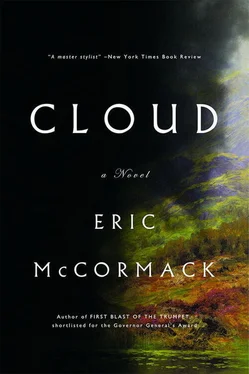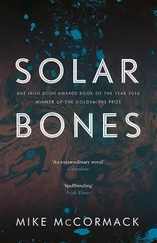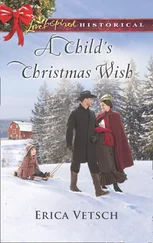The plane had circled back over the Uplands before heading out towards the ocean. There was just enough light to make out beneath us the low hills streaked with snow and the patterns of ancient fields enclosed by walls of heaped-up rocks. In one of these fields, the earth seemed to have been combed into rows that were exactly symmetrical but with occasional protrusions. A lone man with a long-handled hoe jabbed at one of the protrusions, then picked it up and hurled it onto a pile nearby. It appeared to be a human leg, blackened and mouldering. The pile held countless other such decayed body parts.
The man’s eyes turned upwards towards the plane, searching for mine.
CONVENIENTLY, the clatter of the drinks trolley jolted me out of this vivid dream and I got myself a pre-dinner scotch. While I sipped I wondered, as I often did, whether there was any sense to be made of my dreams. Perhaps in this case it might have been spawned by the sensation of flying above the world at an immense height — something no animals except birds had ever been able to do. Surely this novel experience must have altered the way humans now perceived their world. In the dream, the geometrical structure of those fields far below had seemed to me like humanity’s flimsy attempts to scratch a semblance of order out of nature’s chaotic state. The fields themselves were only fertile because the soil was fed by the rotting flesh, just under the surface, of generation after generation of men whose brief lives were snuffed out in yet another piece of human ingenuity— those old mine tunnels that failed to hold up the weight of the earth. To walk in those fields was, therefore, to walk on the remains of the dead.
As for the man in the dream who used the long-handled hoe, I was having trouble making sense out of him. I didn’t like the look of him or the way he’d looked up at me. So maybe he was Death, warning me that even though I was flying high above with a glass of scotch in my hand, my own turn would come.
Altogether, this interpretation of the dream, though a bit on the melancholy side, was quite pleasing to me. Indeed the brief nap, the dream, the scotch, or all three seemed to have got rid of the angst I’d been feeling over Miriam’s choice. Instead I was now full of elation at the thought of two much more significant revelations: that she’d only done what she did because she loved me, and that her daughter — the astonishing Sarah — was my daughter, too.
Add to these two things the memory of that illuminating visit to Curator Soulis in his strange bell tower, and I’d more than adequate cause for celebration. So when the drinks trolley came by again, I ordered another scotch in their honour.
I got back to Camberloo in the early morning, slept till late afternoon, then phoned Frank. Naturally, he wanted to know all about my trip right away. I had to check in at the office for an hour or two, but I promised I’d give him a full account over dinner later that night.
So, around seven, we got together at the Library, a recently opened restaurant in what had originally been one of those big old Camberloo mansions. Only a few diners were there that night. Frank and I sat at a table in the bow window of the former library of the mansion. The room was still lined with impressive mahogany bookcases, but the books themselves had been replaced by a wallpaper of false book covers. As for the meal: the tiny main course tasted all right but was so artisticlooking you felt like a vandal sticking a knife and fork into an oil painting.
Frank was full of questions about my visit to the curator and his research on The Obsidian Cloud . He made me go into detail on every aspect of it, even the characteristics of Scottish quartos— one of them might make a valuable addition to his collection at the Emporium.
So far so good. But now, after I’d brought him fully up to date on the curator’s findings, Frank asked me if I’d managed to visit Duncairn.
I braced myself. It was time to come straight out with the truth, more or less: Frank already knew about my short spell in Duncairn as a young man, but I hadn’t told him that when I was there I’d fallen in love with a girl named Miriam Galt. She’d eventually rejected me, and in despair I’d fled the country. But I’d always been curious to know how things had worked out for her. So I’d taken this opportunity to revisit the town, on the off chance she might actually be there.
Frank looked surprised at hearing all of this for the first time, but he didn’t seem upset, nor did he consider my visit to Duncairn in any way a betrayal of his mother, as I’d feared. He encouraged me to tell him more about the visit.
So I described for him the present decayed state of Duncairn, and how I made the sad discovery that Miriam, my old love, was dead. Then I found out, almost by accident, the reason she’d driven me away all those years ago — she’d been pregnant with our child, a daughter as it turned out. I’d managed to track this daughter of mine down, and met her at a place called Eildon Hall where she worked. Her name was Sarah Mackay.
I was just about to explain that I’d actually known Sam Mackay, Sarah’s proxy father. But Frank, my audience, had progressed from surprise, to incredulity, to delight.
“Do you mean I have a sister — a half-sister? That’s great news!”
I could see he really meant it, and I was very relieved. Gordon must have felt this way about Alicia’s reaction when he revealed she had a half-sister on a remote island in the Pacific.
“Tell me all about Sarah,” Frank said.
So I tried to remember every detail about my visit to her and the impression she’d made on me. He was captivated by all he heard, and we both marvelled for a while about this new member of our family.
“I’d really love to meet her,” he said. “Do you think she’d mind?”
Quite the contrary, I assured him. She’d asked all about him, too, and I knew she’d love to meet him. I’d invite her — along with that fiancé she’d mentioned — to come and pay us a visit so that Frank could get to know her.
The prospect seemed to please him immensely.
IN FACT, I was beginning to think that this making of confessions might be a good thing for me. Wasn’t it time Frank was told, for example, that his grandfather, Gordon, had also fathered a child in a far-off, exotic land? In other words, that his own mother had a half-sister in Oluba who was, therefore, his half-aunt? And that I myself had had more to do with this exotic, tattoo-covered half-sister than I’d been willing to admit to Alicia?
But then I wondered if maybe it wasn’t his mother’s unexpected death that had prevented her from telling Frank about Maratawi. No, maybe even Alicia, with all her fondness for truth, had come to believe that some family secrets were better left untold.
If so, I agreed with her.
I thought back to my midnight fling with Griffin, for example, which still made me shudder. What if I were to confess my part in that little episode to Frank? Wouldn’t that be a good one to get off my chest? I could share it with him, beg for his sympathy on the basis that I didn’t know I was making love to a monster.
But the very idea that a father should try to offload his personal nightmares onto his son seemed unnatural. Indeed, by the time Frank and I had finished our meal at the Library, I’d come to a decision: the confessional path was strewn with a few too many thistles for someone like me.
The next month was a busy one at Smith’s Pumps and I was preoccupied with office matters. I was at my desk early on a Monday morning, assessing upcoming requisitions, when I saw amongst the pile of mail that had just arrived a thick envelope from Curator Soulis.
Читать дальше











